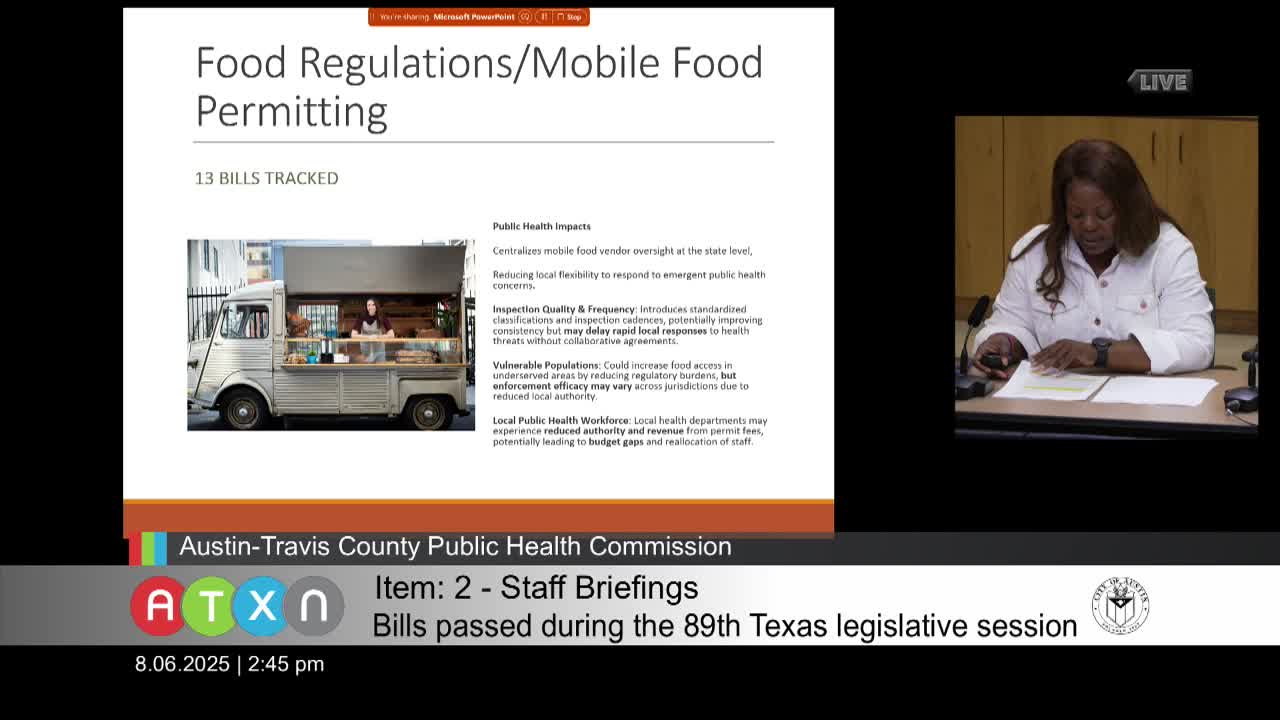Texas Legislature Passes Bills Limiting Local Health Oversight and DEI Initiatives
August 06, 2025 | Austin, Travis County, Texas
This article was created by AI summarizing key points discussed. AI makes mistakes, so for full details and context, please refer to the video of the full meeting. Please report any errors so we can fix them. Report an error »

In a recent meeting of the Austin Public Health Commission, significant legislative changes affecting public health policy in Texas were discussed, highlighting a shift in regulatory authority and potential impacts on local health oversight. The meeting, held on August 6, 2025, focused on several key bills that will take effect on September 1, 2025, which could reshape the landscape of public health management in the region.
One of the most notable pieces of legislation is HB 2683, known as the Mobile Food Vendor Freedom Act. This bill transfers regulatory authority over mobile food vendors from local governments to the Texas Department of State Health Services. Critics argue that this shift could weaken local public health oversight by limiting local permitting and enforcement capabilities, raising concerns about food safety and community health standards.
Another critical development is HB 401496, which aims to enhance public health responses to the opioid crisis. This bill removes legal barriers to distributing fentanyl testing equipment, allowing local health authorities and community organizations to better address overdose prevention. By exempting the use and possession of such equipment from prosecution, the legislation supports harm reduction strategies that could save lives amid the ongoing opioid epidemic.
The meeting also addressed a series of bills related to diversity, equity, and inclusion (DEI) initiatives. Notably, HB 72770 prohibits Texas municipalities from using public funds to support DEI programs, while HB 167, titled the Ending Institutional Racism Act, bans DEI offices in government entities. These legislative changes have raised alarms about their potential to undermine public health efforts aimed at addressing structural inequalities and improving health outcomes for marginalized communities.
Additionally, the commission discussed the implications of bills that restrict protections for the LGBTQ+ community. Recent legislation has limited support for LGBTQ+ health needs, which could weaken trust between public institutions and these communities, ultimately affecting the quality of health services provided.
The meeting also highlighted ongoing efforts to bolster the state's capacity to respond to public health emergencies. Several bills aimed at enhancing disease surveillance and emergency response capabilities were tracked, indicating a legislative focus on improving public health readiness. However, the implications of these changes for local health authorities remain a concern, particularly regarding operational autonomy and funding.
As the commission concluded its discussions, it emphasized the importance of understanding these legislative changes and their potential impacts on public health in Austin and beyond. The meeting served as a platform for stakeholders to process the information and prepare for the challenges ahead in maintaining effective public health oversight and addressing community health needs.
One of the most notable pieces of legislation is HB 2683, known as the Mobile Food Vendor Freedom Act. This bill transfers regulatory authority over mobile food vendors from local governments to the Texas Department of State Health Services. Critics argue that this shift could weaken local public health oversight by limiting local permitting and enforcement capabilities, raising concerns about food safety and community health standards.
Another critical development is HB 401496, which aims to enhance public health responses to the opioid crisis. This bill removes legal barriers to distributing fentanyl testing equipment, allowing local health authorities and community organizations to better address overdose prevention. By exempting the use and possession of such equipment from prosecution, the legislation supports harm reduction strategies that could save lives amid the ongoing opioid epidemic.
The meeting also addressed a series of bills related to diversity, equity, and inclusion (DEI) initiatives. Notably, HB 72770 prohibits Texas municipalities from using public funds to support DEI programs, while HB 167, titled the Ending Institutional Racism Act, bans DEI offices in government entities. These legislative changes have raised alarms about their potential to undermine public health efforts aimed at addressing structural inequalities and improving health outcomes for marginalized communities.
Additionally, the commission discussed the implications of bills that restrict protections for the LGBTQ+ community. Recent legislation has limited support for LGBTQ+ health needs, which could weaken trust between public institutions and these communities, ultimately affecting the quality of health services provided.
The meeting also highlighted ongoing efforts to bolster the state's capacity to respond to public health emergencies. Several bills aimed at enhancing disease surveillance and emergency response capabilities were tracked, indicating a legislative focus on improving public health readiness. However, the implications of these changes for local health authorities remain a concern, particularly regarding operational autonomy and funding.
As the commission concluded its discussions, it emphasized the importance of understanding these legislative changes and their potential impacts on public health in Austin and beyond. The meeting served as a platform for stakeholders to process the information and prepare for the challenges ahead in maintaining effective public health oversight and addressing community health needs.
View full meeting
This article is based on a recent meeting—watch the full video and explore the complete transcript for deeper insights into the discussion.
View full meeting
